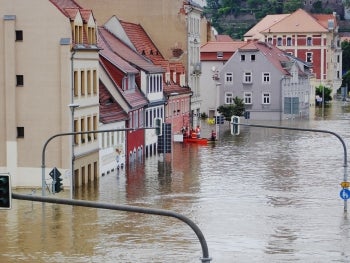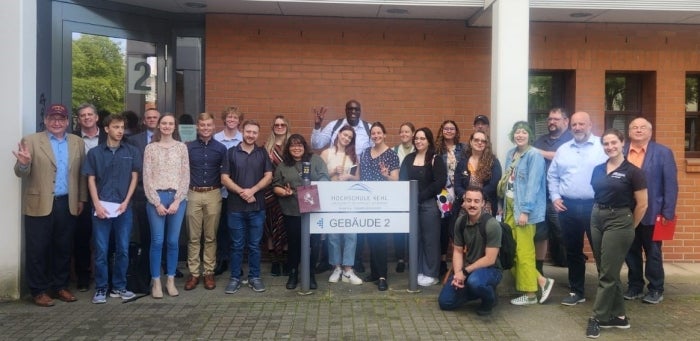ASU students travel to Europe to learn officials’ approaches to major emergencies, climate change, sustainability

ASU students who toured three European nations this summer heard city of Zurich, Switzerland, officials speak on sustainability, resilience and climate adaptation while they visited the state of Baden-Württemberg, Germany. The students also visited the EU Parliament. Photo by Brian Gerber
A group of Arizona State University students traveled across the Atlantic to see firsthand how officials of three European nations handle big emergencies and how they react to climate change and sustainability issues compared with their counterparts in the United States.
The 20 students visited several cities in France, Germany and Switzerland. They met with professionals and academics in each location in a tour that faculty at Kehl University in Germany helped arrange. The trip included a visit to the European Union’s (EU's) Parliament in Strasbourg, France, for a one-day conference on disaster resilience.
The fast-paced summer tour — three countries in eight days, supported by ASU’s Global Education Office — exposed the students in Brian Gerber’s special topics course on Comparative Hazards Management to three national approaches to emergencies and disasters.
Gerber is a School of Public Affairs associate professor and co-director of the Center for Emergency Management and Homeland Security in the Watts College of Public Service and Community Solutions.
The students learned three different sets of national procedures, each differing in many ways from the other. “The course was designed to investigate a highly centralized system in France, a highly decentralized one in Switzerland and a German federal system similar to the U.S., that is in the middle, so to speak,” Gerber said.
Gerber led the trip with Patricia Solís, executive director of the Knowledge Exchange for Resilience in ASU’s School of Geographical Sciences and Urban Planning. Gerber was the keynote speaker at the EU Parliament conference in Strasbourg.
About half of the students — from four different ASU colleges — are emergency management and homeland security (EMHS) majors. The others focus on related fields such as sustainability, engineering and complex adaptive systems, Gerber said.
“Their learning was across subjects as well as across countries, about traditional natural hazards but also cybersecurity, transboundary problems in the EU, meteorology, integrating risk management in smart cities and sustainability,” he said. “There were a lot of territories and topics covered.”
Jessica DePrima, who expects to earn a Bachelor of Science in public service and public policy in August, said the biggest part of the trip was what she called the immense value of observing disaster management at an international level.
“It’s not often you get access to these industry leaders and emergency management professionals on a global scale. I was excited to absorb anything and everything,” said DePrima, whose emergency management internship is with the city of Scottsdale.
In addition, DePrima said she learned that the struggles and barriers the Europeans face collaborating across national borders are similar to those federal, state and local officials experience in the United States.
Thomas Walmsley, an emergency manager with Bernalillo County, New Mexico, expects to earn his Master of Science in EMHS, with a concentration on community resilience, in May 2025. Walmsley said he compared the separate entities he works with, such as tribal communities, with the three nations’ approaches.
He said emergency planners in the European nations looked more toward future mitigation and resiliency, while their U.S. counterparts are “still very much in the response phase.” Walmsley also observed greater emphasis on recycling in Europe, and less reliance on air conditioning than in the United States, even on warm days.
“You felt a lot more … acceptance of climate change and looking into the future, while it’s still a political hot topic here,” Walmsley said.
DePrima agreed.
“In France and Switzerland there is strong climate presence, and sustainability is embedded in their culture. They have a heavy incorporation of sustainability measures and climate change adaptation,” she said.
Ryan Huber, who has worked more than nine years as an identification and arrest process analyst for the Denver Police Department, expects to earn his Master of Science in EMHS in December.
He said after hearing Solis’ presentation on record heat in Phoenix, hurricanes in the Gulf of Mexico, blizzards in Colorado and tornadoes in the Midwest, American officials seem to face more extreme weather events and natural disasters, while Europeans are able to focus more on sustainability and climate change.
“They have more of a civic buy-in to reversing climate change there,” Huber said. “It was interesting to visit Strasbourg, where there is a combining of cultures, feeling of unity (and a) softening of country borders. It seems there’s a whole lot of cooperation.”
Huber agreed that Germany was similar to the U.S. in emergency response, and said he was impressed with the quality of equipment and the crisis management team at an emergency operations center the group toured in Stuttgart, Germany.
“They may not have the extreme or frequent disasters as we do, but the presentations were all about lessening the impact,” he said.
More Local, national and global affairs

Higher education key to US competitiveness, security
ASU President Michael Crow’s notion of universities as public service institutions — places that serve society in practical and meaningful ways to solve pressing issues of importance to the country…

Military program leaders learn about breadth of ASU's defense-focused initiatives
Arizona State University seeks to be the U.S. military’s top partner in strategic learning and innovation. To advance this vision, the Office for Veteran and Military Academic Engagement hosted…

Expert discusses America's place in outer space with ASU students
If you asked Esther Brimmer about what security issue the United States should focus on next, she might say the moon. In fact, that’s exactly what she recently told a student at an event hosted by…



